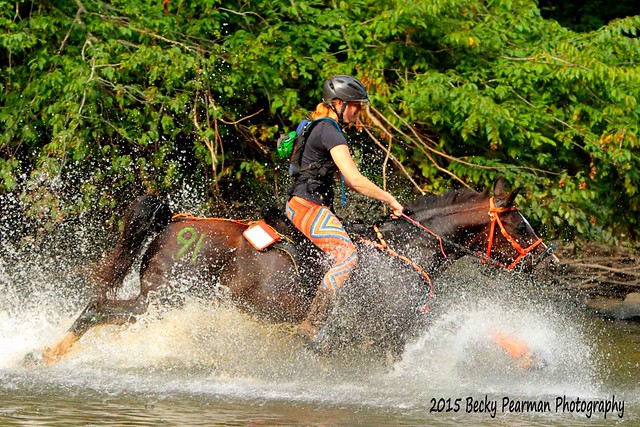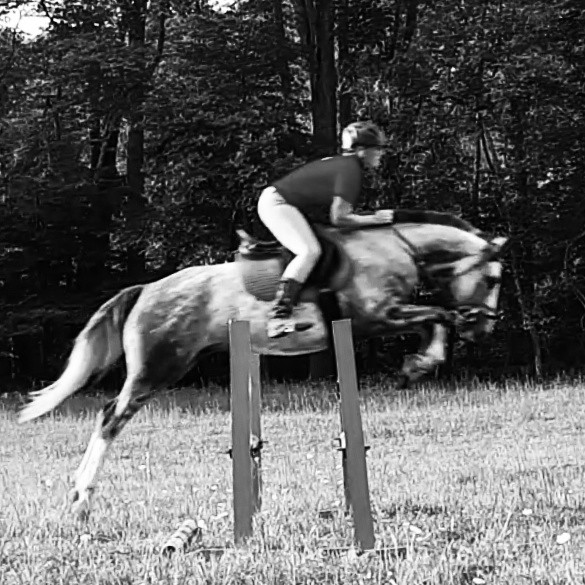An Unspoken Goal, my History, and the Present
An unspoken goal of mine this year has been to remove my emotions from situations where my horses are just being horses. It's been a habit I have had to form, but I've been quite successful. Things are infinitely better as a result.As a scientist, I think very analytically. I'm aware of the dangers of anthropomorphizing my animals, too. However, as a pet owner and one who is so involved with her animals, it's hard to keep the anthropomorphism at bay all of the time. You want to humanize something you spend so much time with, especially when you're spending as much or more time with them than
---
As a teenager, I never took the horses I rode so seriously. I wanted a "bond" with a horse, certainly, but I wasn't emotionally involved nearly as much as I became when the horses I rode became *mine*. I rode Stan for 4 or 5 years almost exclusively. I had a really great bond with that horse. But even then, I wasn't emotionally vested in a sense where I would take personal offense to his misbehaviors. Oh no. That didn't begin until I had horses of my own.
I suppose it began because I had so much time and money wrapped up into my own animals. I knew they were mine to do with what I pleased. Stan and the other horses of my past were owned by others. This fact kept me - and my emotions - a little reserved at all times in order to protect myself from ever getting too attached. With my own animals, I could finally allow myself to get attached.
And I did. And despite knowing I shouldn't, despite trying not to, despite denying it, I anthropomorphized the shit out of my horses.
---
I spiraled down the anthropomorphism vortex HARD. Caught up in that vortex, my emotions became incredibly attached to my animals' every action. Imperfections and misbehaviors on their part became personal assaults against my very being. And that's just silly.
It became exceptionally silly when, due to a myriad of other life stresses, I was in a constant state of fretting and anxiety last year. I couldn't ride Q without angry outbursts. I took personal offense to her every spook. This snowballed her behavior because she grew afraid of me. Griffin is a far more stoic critter, and thus had greater patience with me even when his occasional misbehavior sent me off the edge. Fortunately, my interactions with him didn't suffer so much.
Seeing them for what they are
Q for various unknown reasons in her past interaction with humans has a great tendency to be a very fearful animal. It's how people have made her; they've conditioned her flight response in an extreme way. It's a shame that she has experienced things that have left such an impression years later, but such is the nature of a traumatic experience for most living creatures.Time, patience, proper training and positive reinforcement have largely resolved her suspicious and spooky nature when you work with her from the ground. Under saddle is still a work in progress, though we are getting there. Admittedly, it is more difficult to train through her issues under saddle because her favorite form of outburst is a wicked spook that unseats me a minimum of 50% of the time.
She doesn't purposefully try to unseat me; she isn't a horse who tries to unseat its rider - in fact, she's never even bucked or reared under saddle! However, she is genuinely fearful of a perceived stimulus and she reacts with gusto to escape it. Her instinctual response is so hardwired and acute that my human brain and body can rarely react in time. My body objects greatly to being tossed so often, as most would; even when I remain mounted, it is still a toll on my body. Arabian chiropractic adjustment anyone?
---
Griffin is a far more stoic critter. His past is largely known to me. He came to me as a nearly blank slate. I am almost 100% certain he was never ever mistreated in his life. As a result, he fosters no great fear of people. He experiences no anxiety about things like Q does. He doesn't anticipate something horrible from the world. He's exactly what you'd expect from a healthy animal with positive human interactions. He's a joy to work with as a result.
Griffin's outbursts are purely those of a young, green horse learning the ropes. He tests his boundaries time and again when training takes the next step up in difficulty. They're almost always very mild and we move past them in seconds. He reacts if he's in pain of some sort, too, as most horses do. His painful stimuli almost always is a result of a bug as he has a very small tolerance for the bastards.
Reacting with logic and not emotion
The frequency of Q's outbursts and the magnitude of her fear about the world around her under saddle is troubling as a rider and trail partner. It's difficult to enjoy my ride when I'm under constant fear of hitting the turf. However, while the frequency of these spooks is frustrating, they very rarely infuriate me as they once did. I don't take personal offense to them any more; if I do get angry, it's because her constant reactions are causing me pain and it's more difficult to stay calm when you're in pain (often from being whipped back and forth from riding out her dodgy spook). Though I rarely react with anger the times I've actually hit the ground; when that happens I just bounce back up into the saddle without a sound because this confuses the little horse to no end which amuses me greatly.Training through this issue is definitely not as black and white as other training issues, but we are getting there. Riding with the dressage whip helps greatly. She isn't inclined to listen to my voice when her instincts are peaking, but she does feel the tapping of the whip on her shoulder and that helps bring her down from the brink of her flight response. The tapping also helps to subdue a reaction before it builds at all.
 |
| A very game horse who is relaxed about her job...despite the water in her ears! Photo by Becky Pearman |
Depending upon the terrain, the trail, the company or lack thereof, and the type of reaction Q is having/building (mild, moderate, severe), I know to employ one or several various tactics: speed up, slow down, tap with a certain frequency, pop her one good one to snap her back to the present moment, or let her follow behind others. Always though, it helps to talk to her in a positive tone of voice - she likes that a lot and responds to it well.
So, instead of pushing the issue and forcing her to work through every moment of trepidation (and potentially leading myself down a path of blind fury), I just do what I know will work to make the ride less stressful for all. As a result, we've gotten a lot of great miles in this year. I know that with repetition and miles, Q can be a really fun, reliable trail partner. She also really does relax into her job once her confidence is built up. That's the most rewarding thing of all - watching this horse find success and - to anthropomorphize - enjoy her job.
---
Griffin's outbursts don't end our workouts with a fit of fury on my part any more as they have int he past because I'm able to dial down and refocus to help him succeed. I recognize that he isn't reacting to piss me off on purpose, he's reacting because he really wants to succeed. If I haven't rewarded Griffin with a pat or a "good boy!" for awhile, he's more likely to have some kind of outburst. These are often super mild (shaking his head), but it's enough to trigger me to realize I haven't rewarded his efforts recently.
Griffin wants so badly to please. I've never met a horse who tried so hard. He picks up on things insanely fast. His training with me has always been so full of rewards for doing the right thing that he now actively seeks out the reward. If he doesn't get the reward, he has a bit of an outburst because he isn't sure how else to respond/communicate. To anthropomorphize this, he's confused and frustrated.
If I'm good about rewarding him and setting him up for success, he does better and better. Setting him up for success means dialing whatever we're working on back down to square one following bigger outbursts. He has to find success before he can try new things.
His intelligence leads to some comical moments sometimes because he anticipates what the answer may be based on other things we've done. When he's asked to try something that is similar yet different & new from the old answer, he tends to have more outbursts because he can't figure out what the "new" answer is. He tries the "old" answer, and maybe an even older one, and when those don't work, he has *a moment*. As the trainer in this situation, I have to figure out how to ask for the "new" answer in a better way so he can succeed. It's a puzzle! But it's a fun one.
If anyone ever watched one of my rides with Griffin, they'd easily observe how content this horse is with his job. To anthropomorphize, he's happy.


No comments:
Post a Comment